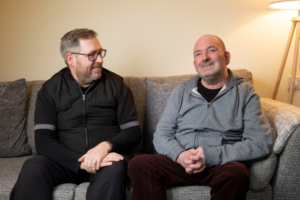Health and Social Care
Voices of community health and social care: Richard and Martin’s story
July 21, 2023 by ncscommunications No Comments | Category National Care Service
Over the course of the past year, we have been up and down the country filming for our Voices campaign. We have heard from people who use and work in community health and social care, listening to their experiences and how this has shaped their hopes for the National Care Service.
Richard volunteers as a one-to-one befriender for Lanarkshire charity LEAP, which aims to tackle loneliness and isolation in the community. He visits Martin, who has some physical disabilities and cognitive impairment after a serious motorcycle accident when he was younger.
Can you tell us a bit more about your befriending role and how you got into it?
A befriender is someone who comes to visit and provides companionship and friendship to someone in need. I had been looking for a way to give back in the community for some time, but I wasn’t sure what I could actually offer. A couple of years ago I was looking at local opportunities online and came across the befriending roles. I’ve got an elderly grandmother who spends a lot of time on her own, so I was aware of the impact of isolation. I filled out an application and someone got back to me within an hour to discuss. I attended some training sessions and a couple of months later I was paired up with Martin.
Can you tell us more about how you support Martin?
I visit Martin once a week and we usually just spend a lot of time chatting and try to get out and about as much as we can. We’ll go to local cafes for coffee and cake, or if the weather is really bad we’ll just stay in watch some telly and bounce jokes off each other.
As well as being a friend to Martin, I’m also there to signpost things. So if he mentions something that I’m a bit concerned about or that he needs some help with, or if I just think he’s feeling a bit down, I can feed that back to LEAP and they can pass it on to the right person so something gets done about it.
What do you get out of your befriending role?
With Martin, I can tell he appreciates me coming to see him. He has a lot of support workers and carers who come and go, but they all provide some sort of service for him. His family give him a lot of care and support too but I’m the only person who turns up to talk to him as a friend. There was one moment last year where he realised that I wasn’t a paid carer or support worker, he said to me that he understood that I was actually there as a volunteer and I did it because I wanted to. That recognition from Martin was enough for me, it was a real lightbulb moment.
I’m also just as happy to see Martin as he is to see me. We have a great time together – he’s a really positive person and that definitely rubs off on me when I spend time with him. I think we both feel really happy after we’ve spent time together – it’s a two-way thing.
What are some of the challenges within your role?
Because I’m a volunteer, I have to juggle it around the rest of my life. I’ve got a full-time job and I’ve got a family. My kids are a bit older now so they don’t need the same amount of support they used to, which gives me more free time, but befriending is still an extra responsibility, and not something that everyone would be able to do.
Why do you think befriending services are important?
People are social animals – we flourish better with company. Loneliness has such a massive impact on people’s wellbeing. And poor mental health can often have a knock-on effect on people’s physical health – they maybe aren’t as good at taking care of themselves and getting out and about. It’s amazing how much an hour-long chat or knowing a friend is coming to see you actually helps you. So, I think these types of services are really, really important.
How do you think future improvement could help people like Martin?
I think there’s a gap between the health service and social care and hopefully a National Care Service would help address this. The NHS is brilliant, it’s so good at looking after people and making them better, but there needs to be more support with the care side of things. The befriending I do with Martin for instance, that’s provided through a charity. People have to approach the charity for help, or the charity has to be made aware of people requiring help before any action can be taken. But I’d like there to be a system in place so that people who need this type of help are offered it automatically, and that they can access it wherever they are.
People can be affected by loneliness at any age, but it is often older people that are looking for company, and with an ageing population, I think the need for befrienders is only going to increase. It would be good if the National Care Service took this type of support into consideration.
If you have experience of community health and social care, please register for our Lived Experience Experts Panel and help us design a National Care Service which meets the needs of everyone in Scotland.
We’re also hosting a series of in-person and online forums this summer as part of the development of the National Care Service. You can find out more information and how to register your place on gov.scot/ncs.
Tags: lived experience, national care service


Leave a comment
You must be logged in to post a comment.